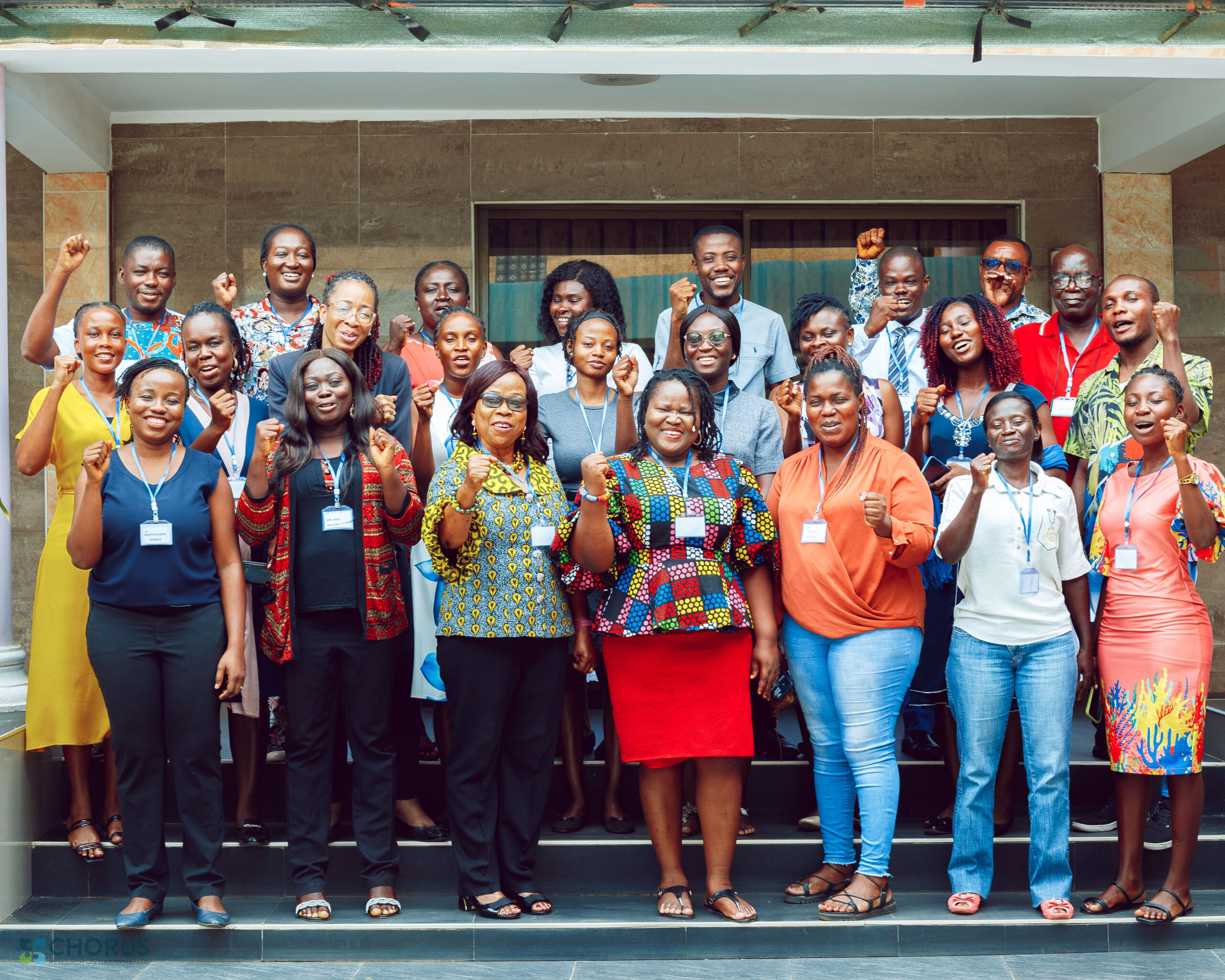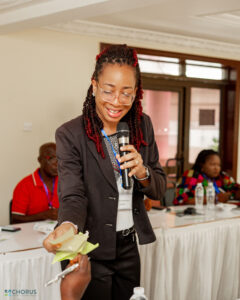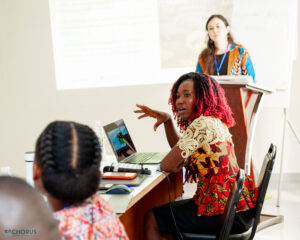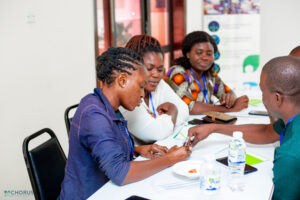
Blog: Delivering Health Information in Urban Areas – The Intersection of Media and Research
by Delali Kumapley (CHORUS Research Uptake Co-Lead)
Health information rides on the wheels of communication and the media[i] by providing information to improve health and influencing healthcare decisions. During the needs assessment of the CHORUS Ghana study, for instance, residents in the study sites referred to television, radio, and the internet as their primary sources of health information. Health information, via the media, is also consumed by healthcare professionals and policymakers.
In Ghana, different newspapers, television and radio channels churn out health-related content, and mostly, journalists are responsible for developing them.[ii] However, experts believe that health reporters need specific skillsets and knowledge to function because writing on health is delicate and many readers make decisions based on such reports.[iii]
This raises the important question of what is required of reporters, particularly in the field of health. What skills should they possess and how can they relate with health researchers to ensure the appropriate messages on health and its related policies are carried out to the right audience?
 These and other questions were raised during a media engagement workshop organized by CHORUS Ghana from the 20th –the 21st of April 2022. The workshop was a collaboration with Dr. Charity Binka, Executive Director of Women Media and Change (WOMEC) and a section of journalists from the Ashanti, Eastern, Central, and Greater Accra Regions mainly from the print, broadcast and new media. The media engagement workshop sought to answer some of the questions raised above and to build a good relationship between journalists and researchers on CHORUS.
These and other questions were raised during a media engagement workshop organized by CHORUS Ghana from the 20th –the 21st of April 2022. The workshop was a collaboration with Dr. Charity Binka, Executive Director of Women Media and Change (WOMEC) and a section of journalists from the Ashanti, Eastern, Central, and Greater Accra Regions mainly from the print, broadcast and new media. The media engagement workshop sought to answer some of the questions raised above and to build a good relationship between journalists and researchers on CHORUS.
It was agreed that a basic requirement for journalists to carry health and urban-health information accurately was clear communication. Journalists needed health researchers to provide more clarity when offering explanations. There was a general appeal to researchers to engage media practitioners not only during the dissemination of research findings. Journalists expect to be involved at crucial points during the entire research process.
“The researchers should have the ability to forge a relationship with us, they must use simple languages and be less technical, knowing very well that they also need people like us to carry their information,” said one of the journalists.
Mutual respect, understanding, and trust between themselves (journalists) and the researchers were considered vital in ensuring the right messages are delivered.
Health and Primary Health Care (PHC) in Urban Ghana
The urban population is growing rapidly, making urban health issues more prevalent. Studies have confirmed the struggle to survive in some of Ghana’s largest cities. For example, poor urban dwellers pay for most of the health services they receive compared to their non-poor neighbours. [iv]
During the media engagement, there were discussions on the dire health issues – including but not limited to increased risk of contracting non-communicable and communicable diseases, the persistent threat of infectious disease outbreaks, violence, and high rates of depression, anxiety and mental ill-health. These play a significant role in urban health outcomes. Congruent to the health challenges are issues socially determined by poor sanitation and housing, unemployment, poverty, education, and access to healthcare and housing. Therefore, without targeted effort to address the health implications of rapid urban growth, conditions in Ghana’s cities will worsen and the progress toward Universal Health Coverage (UHC) would be a mirage.
limited to increased risk of contracting non-communicable and communicable diseases, the persistent threat of infectious disease outbreaks, violence, and high rates of depression, anxiety and mental ill-health. These play a significant role in urban health outcomes. Congruent to the health challenges are issues socially determined by poor sanitation and housing, unemployment, poverty, education, and access to healthcare and housing. Therefore, without targeted effort to address the health implications of rapid urban growth, conditions in Ghana’s cities will worsen and the progress toward Universal Health Coverage (UHC) would be a mirage.
The journalists were also exposed to the Community-based Health Planning and Services (CHPS) in Ghana which has yielded positive outcomes in rural communities but the same is yet to be said in urban communities. Current research activities of CHORUS Ghana are exploring opportunities to optimize all avenues of PHC in the study sites. This will be achieved through its “Linking Communities, Local Government and Health Workers to Support Life Cycle Health Promotion and Prevention Policies, Programmes and Services at the Household and Community Level in Urban Poor Neighbourhoods in Ghana” project.
Media Engagement and the Formation of an Informal Health Network
 The two-day media engagement with the theme, Effective Use of the Media to Promote Urban Health for Better Outcomes, also exposed these journalists to health research, specifically relating it to urban health and its policies. It was to sharpen their knowledge and skills and, deepen their interest in reporting on urban health issues.
The two-day media engagement with the theme, Effective Use of the Media to Promote Urban Health for Better Outcomes, also exposed these journalists to health research, specifically relating it to urban health and its policies. It was to sharpen their knowledge and skills and, deepen their interest in reporting on urban health issues.
“The two-day training has revealed the different layers of urban health to me. I think I can now play an advocacy role to educate, sensitise and write compelling stories to attract the attention of policymakers that will lead to better health outcomes for all,” said one of the journalists
In the last session of the media engagement, an informal urban health media network was formed. This network intends to drive the journalists who attended the workshop to cover more urban health stories in Ghana. The network will also coordinate with journalists in other CHORUS countries to sustain media coverage of urban health systems and policies. After the media engagement, the workshop and CHORUS received extensive media coverage. Stories about the event were featured in recognized news outlets including the Ghanaian Times, Daily Graphic, Ghana News Agency, and Ghana Broadcasting Corporation.
Photo credit: University of Ghana
[i] Wellings, K. and Macdowall, W. (2000), “Evaluating mass media approaches to health promotion: a review of methods”, Health Education, Vol. 100 No. 1, pp. 23-32.
[ii] Kantam, J. K. (2020). Assessing the Coverage of Health Issues in Ghana-A Study of Daily Graphic and Facebook (Doctoral dissertation, Ghana Institute of Journalism).
[iii] Schwitzer G, Mudur G, Henry D, Wilson A, Goozner M, et al. (2005) What are the roles and responsibilities of the media in disseminating health information? PLoS Med 2(7): e215.
[iv] Amankwa B (2021) [Blog] –https://www.undp.org/ghana/blog/improving-health-outcomes-urban-poor (accessed on 7th June 2023)